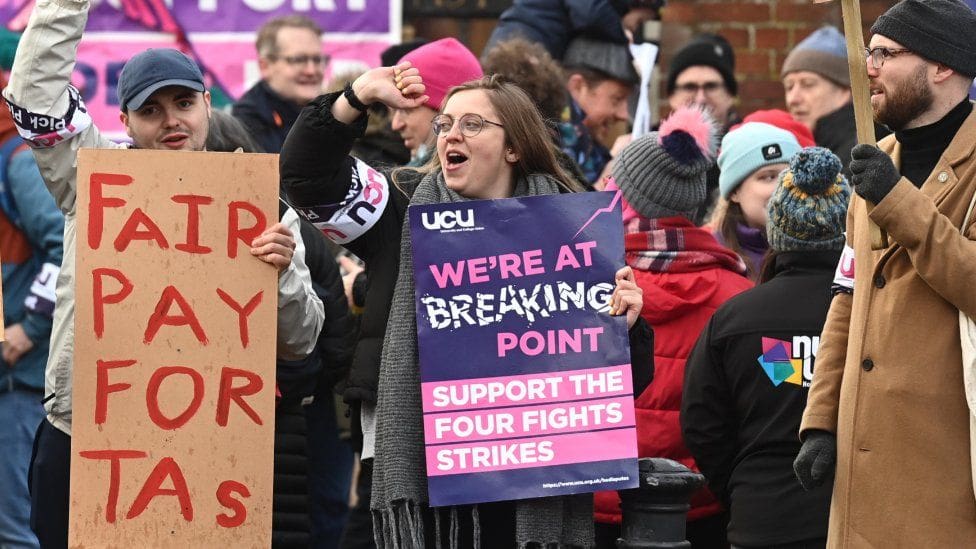Management at Queen Mary University of London (QMUL) has allegedly threatened to break a staff marking boycott by bringing in Melbourne-based education consultancy Curio Group (CG). The University and College Union (UCU) Queen Mary branch announced on Twitter that the group may be brought in to mark student essays to circumvent the Union’s marking boycott.
The marking boycott is in response to University management’s decision in March to suspend 100 per cent of pay for those who undertook lawful action short of strike during UCU strikes across 68 universities across the UK. The strikes have taken aim at lagging pay, pensions, and poor working conditions across the sector.
Despite academic assurances from the QMUL Principal Colin Bailey, the UCU suggested that the move would risk undermining academic standards and “devalue QMUL degrees”.
Questioning how the self-described “education advisory and services organisation” could be qualified to replace University Professors, the UCU Queen Mary branch wrote on Twitter: “Are these consultancy staff really going to be able to mark Modern Language exams, accredited degrees in Law, or final year dissertations?”
According to the UCU, there are grounds for students and staff to file complaints to the Office for Students, the Quality Assurance Agency (QAA), and the Office for the Independent Adjudicator (OIA). The QAA is an independent charity working to benefit students and higher education, and one of the world’s experts in quality assurance; the OIA is a free service in England and Wales that reviews complaints filed by students about higher education providers.
The UCU also claimed it would risk breaking British employment law, which bans using agency workers to break a strike: “Those found in breach of the agency worker regulations can be investigated by the Employment Agency Standards Inspectorate and fined,” said the UCU Queen Mary Branch on Twitter. It is currently unclear whether Curio is an employment agency subject to Regulation 7 of the The Conduct of Employment Agencies and Employment Businesses Regulations 2003.
When asked for comment, a QMUL spokesperson told Honi that they are “disappointed to be facing industrial action once again at Queen Mary, which continues to affect a very small number of teaching programmes.
“We have been clear from the outset that our first priority is to protect all our students’ education and experience, and to uphold academic quality and standards. We will continue to use a range of measures to mitigate any impacts from the continuing 5-year national UCU industrial action and to protect our students’ education.”
No comment was made about the nature of the Curio Group, nor anything substantive regarding the Union’s concerns surrounding a loss of academic fairness created by potential use of the service.
The Curio Group recently provided the University with remote learning technologies training. This is not only indicative of a preexisting working relationship, but the training itself was also criticised by staff. The Group’s website claims that the project attempted “to meet academics where they were and develop a shared foundation what makes a great online learning experience [sic].”
Curio has also been used in an Australian context. Former NTEU USyd Branch President Kurt Iveson responded to the UCU’s Tweets saying that the group had done education design work “that should have been performed by University staff.”
NTEU NSW Secretary Damien Cahill told Honi: “We condemn the use of strike breakers by Queen Mary management. Curio, the company accused of potential strike breaking at QMUL, has played a role in the outsourcing of work here in Australia.
“The NTEU took the University of Sydney to the Fair Work Commission a few years ago over outsourcing education and design work to Curio – work that should have been done by University of Sydney staff employed under the union-negotiated enterprise agreement. This highlights that the corporatised education industry is global, and the issues faced by university staff across many countries are similar, as are our struggles for better working conditions.”
Curio’s website indicates they were employed in a curriculum redesign project with the USyd School of Life and Environmental Sciences. Curio was also engaged to create a Canvas site for international students arriving at USyd.
The UCU ultimately characterised the move as “a sign of management in crisis.”
“Forget the lies about industrial action having minimal impact at QMUL. These plans show they are worried about the marking boycott. They are preparing to adopt extreme measures to try to get around it,” it said in a tweet.





